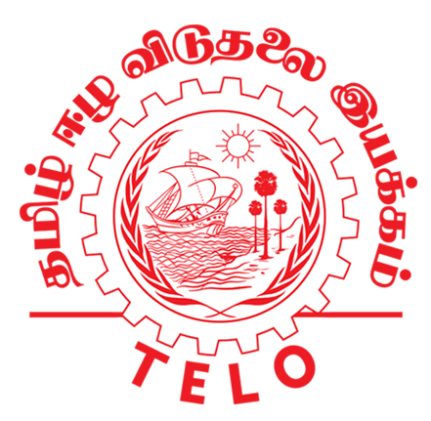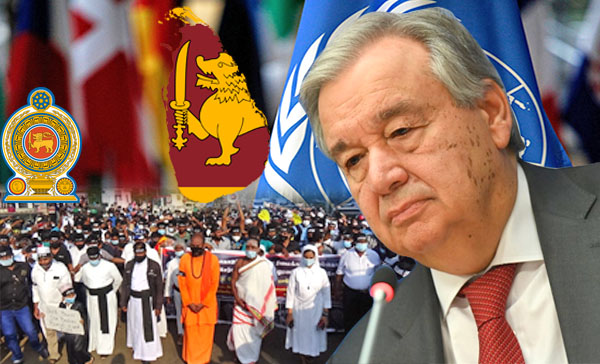An updated draft United Nations Human Rights Council (UNHRC) resolution on Sri Lanka was released this morning, showing some changes to the language of the text but still falling short on Tamil demands for an international accountability mechanism.
The updated draft resolution now calls on the Office of the High Commissioner for Human Rights to “collect” as well as “consolidate, analyse and preserve” evidence that could be used in future war crimes trials. However, it has failed to implement UN High Commissioner, Michelle Bachelet’s recommendations which call on member states to consider asset freezes and travel bans on Sri Lankan officials credibly accused of human rights abuses and to consider “steps towards the referral of the situation in Sri Lanka to the International Criminal Court (ICC).”
The changes, made public this morning, include:
“Recognizes the importance of preserving and analysing evidence relating to violations and abuses of human rights and related crimes in Sri Lanka with a view to advancing accountability, and decides to strengthen the capacity of the Office of the High Commissioner to [collect], consolidate, analyse and preserve information and evidence and to develop possible strategies for future accountability processes for gross violations of human rights or serious violations of international humanitarian law, to advocate for victims and survivors, and to support relevant judicial proceedings in Member States with competent jurisdiction”
Concerns over the “increased marginalisation of Tamil and Muslim minorities, surveillance and intimidation of civil society, restrictions on media freedom, and shrinking democratic space; restrictions on public memorialisation of victims of war including the destruction of a memorial”
“Also calls upon the Government of Sri Lanka to ensure the effective and independent functioning of the Human Rights Commission of Sri Lanka, the Office on Missing Persons and the Office for Reparations to deliver their respective mandates as established”
“Further calls upon the Government of Sri Lanka, having due regard for the rule of law and human rights to protect civil society actors including human rights defenders to investigate any attacks and to ensure a safe and enabling environment in which civil society can operate free from hindrance, surveillance and insecurity and threat of reprisals.”
The updated resolution marks the first time that Sri Lanka’s marginalisation of Tamils and Muslims and restrictions on memorialisation are being recognised in the operative paragraphs of a UN resolution. Earlier this year authorities destroyed the Mullivaikkal monument that was constructed in Jaffna University to commemorate those killed by a Sri Lankan military offensive in 2009. As global outrage ensued, authorities reportedly allowed it to be rebuilt, but restrictions on memorial events have been repeatedly put in place by Sri Lankan authorities.
The surveillance of human rights defenders is also highlighted and comes as Tamil families of the disappeared come under increasing harassment from Sri Lankan security forces.
Responding to the updated draft, former Senior Lecturer in Law at University of Jaffna, Dr Kumaravadivel Guruparan said that it has simply been “tweaked”.
“It still doesn’t do enough to alleviate our most fundamental concerns,” he continued. “The inclusion of ‘collect’ in OP6 makes it better but the usefulness of the mechanism will depend on a) what judicial processes it will be feeding into and b) how much funds OHCHR is allocated.”
“In the absence of any information regarding a wider judicial process, the whole thing is as good as it is on paper,” he added.
As the UNHRC meets this month, Tamils in the North-East and in the diaspora have undertaken hunger strikes and protests calling on the international community, particularly members of the Core Group on Sri Lanka, to refer Sri Lanka to the ICC.
Tamil activists and politicians have expressed their disappointment over the draft resolution for failing to hold Sri Lanka accountable for serious human rights abuses. Earlier this week, both the Tamil National People’s Front (TNPF) and the Tamil Civil Society Forum (TCSF) submitted letters to the UNHRC to highlight that the resolution fails to “even meet the basic expectations of the Tamil victims” in pursuing international accountability for war crimes committed by Sri Lanka.
In their letters, they highlighted that Core Group’s request to the Office of the High Commissioner of Human Rights (OHCHR) to enhance its monitoring and reporting on the human rights situation in Sri Lanka, “stagnates accountability at the UNHRC in Geneva.”
The resolution which sets a deadline for March 2022 for “a written update to the Human Rights Council” and a “comprehensive report including further options for advancing accountability” later that year has been criticised for stalling accountability and justice for victim-survivors.
Addressing the UNHRC this week, Leeladevi Anandanadarajah, the Secretary of the North-East Relatives of the Missing Persons Association, criticised the undue praise of Sri Lanka’s domestic accountability mechanisms, particularly the Office for Missing Persons (OMP), which they have continuously rejected as it has repeatedly failed to address Tamil grievances.
Last week, the Core Group, the EU, Australia, and Switzerland alongside a number of other countries expressed concern over the worsening human rights situation in Sri Lanka as they responded to the UN High Commissioner’s report. Sri Lanka told the UNHRC that it “categorically rejects the conclusions and recommendations” of the UN High Commissioner’s report and called on member states to reject any resolution on Sri Lanka.





